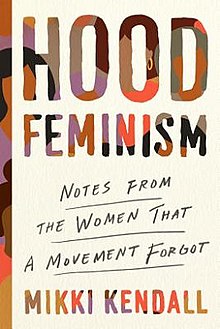Hood Feminism
 First edition | |
| Author | Mikki Kendall |
|---|---|
| Subject | Intersectionality and feminism |
| Publisher | Viking Press |
Publication date | February 25, 2020 |
| Pages | 288 |
| ISBN | 978-0-525-56054-8 |
Hood Feminism is a 2020 non-fiction book by Mikki Kendall about intersectionality and feminism.
Background[]
It was published on February 25, 2020, by Viking Press.[1]
Synopsis[]
The book consists of 18 separate essays. Through an intersectional framework, Kendall argues that mainstream feminism has excluded a number of women's issues, particularly those of women of color, and explores how a number of issues affect women, including the education gap, poverty, food and housing insecurity, and gun violence.
Reception[]
Between June 28, 2020, and June 20, 2021, the book entered the Los Angeles Times's bestsellers list eight times.[2] Time listed the book as one of "100 Must-Read Books of 2020".[3]
Kirkus Reviews praised the book as a "much-needed addition to feminist discourse".[1] Ericka Taylor lauded the prose as "clean, crisp, and cutting" and found that Kendall provided suggestions of how to "reach a more encompassing, intersectional feminism".[4] In contrast, Julie Lythcott-Haims of the Washington Post reviewed that some of the book featured "overly generalized" arguments, "opaque" writing and cliches. However, Lythcott-Haims stated that the book is convincing in its "conclusion that poor and working-class women, particularly when of color, lead a profoundly different life in America than their wealthier and white counterparts".[5]
References[]
- ^ a b "Hood Feminism". Kirkus Reviews. November 25, 2019. Retrieved June 19, 2021.
- ^ Los Angeles Times bestseller list:
- June 28, 2020: "Bestsellers List Sunday, June 28". Los Angeles Times. Retrieved June 19, 2021.
- July 12, 2020: "Bestsellers List Sunday, July 12". Los Angeles Times. Retrieved June 19, 2021.
- July 19, 2020: "Bestsellers List Sunday, July 19". Los Angeles Times. Retrieved June 19, 2021.
- March 7, 2021: "Bestsellers List Sunday, March 7". Los Angeles Times. Retrieved June 19, 2021.
- March 21, 2021: "Bestsellers List Sunday, March 21". Los Angeles Times. Retrieved June 19, 2021.
- April 11, 2021: "Bestsellers List Sunday, April 11". Los Angeles Times. Retrieved June 19, 2021.
- May 30, 2021: "Bestsellers List Sunday, May 30". Los Angeles Times. Retrieved June 19, 2021.
- June 20, 2021: "Bestsellers List Sunday, June 20". Los Angeles Times. Retrieved June 19, 2021.
- ^ "Hood Feminism by Mikki Kendall". Time. November 11, 2020. Retrieved June 19, 2021.
- ^ Taylor, Ericka (February 26, 2020). "'Hood Feminism' Is A Call For Solidarity In A Less-Than-Inclusive Movement". NPR. Retrieved June 19, 2021.
- ^ Lythcott-Haims, Julie (April 8, 2020). "'Hood Feminism' makes a convincing — and urgent — case about how race and class divide women". Washington Post. Retrieved June 19, 2021.
Further reading[]
- Booker, Christopher (July 18, 2020). "'Hood Feminism' makes a case for women ignored by the movement". PBS. Retrieved June 19, 2021.
External links[]
- 2020 non-fiction books
- Books about feminism
- Books about race and ethnicity
- Viking Press books